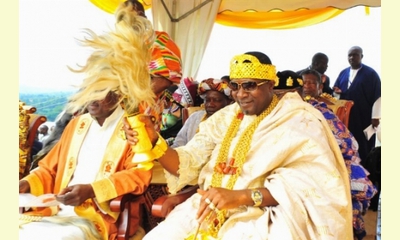|
|
These intellectuals, guardians of traditions (Africa)
an article by Serge Mathias Tomondji, Notre Afrik
The demand by African chiefs for a clear legal
status in the African Union, calls attention to the
highly political role traditionally played by tribal
chiefs in our changing societies.

The traditional chiefs want a clear role - Credits: Fratmat Archives
click on photo to enlarge
Africa is at a crossroads, seized by multiple and
multifaceted crises. Meanwhile, as we seek to find
ourselves in our rapidly changing societies,
forced to deal with the accelerated opening of
modernism, there is need for a stronger
institutional presence of traditional chiefs in
our international institutions ...
In August 2012. at Benin City of Savalon, located
some 250 kilometers north of the economic capital
of Cotonou, there was an unusual event: a sort of
summit conference of kings and traditional chiefs
in Africa, convened by Tossoh Gbaguidi XIII, king
of that locality.
The royal discussions lasted two days with an
"approach to peace at once sociological,
historical and modern, as well as the development,
prevention and resolution of conflicts in Africa."
In addition: the "endogenous foundations of the
culture of peace and the protection of democratic
freedoms for a harmonious and sustainable
development of the African continent." In this
regard, the chiefs have examined the "limits and
legal instruments for the prevention and
settlement of pre-and post-election conflict."
However, beyond these critical discussions, the
forum led to a clear demand: legal status,
including a vote in the African Union (AU), an
agreement on the role and place of kings and
traditional chiefs in the institutions in the
state. "We want our kings involved in the
decisions of the AU. We will work tirelessly so
that the kings have at least the position of
observers, "said the initiator of the forum,
Tossoh Gbaguidi XIII, before some seventy figures
from various African countries who responded to
the invitation.
This request comes at moment when the continent is
at a crossroads, seized by multiple and
multifaceted crises, and for which the guardians
of traditions want to play their part. The
conflicts in Mali, Guinea-Bissau, the Central
African Republic, the Democratic Republic of Congo
... remind us of this.
But the demand of the traditional leaders for a
clear legal status, so that their leadership is a
valid voice in the African Union, also reaffirms,
without doubt, the highly political role
traditionally played by the chiefs and kings in
our changing societies. "I think the approach of
the leaders do not lack common sense. We must
examine it intelligently and put into our
governance a part of the African spirituality and
culturalism, "said Albert Ouedraogo, professor of
literature at the University of Ouagadougou and
specialist in African oral literature.
(This article is continued in the discussionboard)
(Click here for a French version of this article)
|








|
DISCUSSION
There is no question yet associated with this article.
* * * * *
LATEST READER COMMENT:
(The following is continued from the main article listed above.)
In fact, in their dealings with today's societies,
traditional kings and chiefs have lost some of
that mystical and secret side, an ignorance of
the "things of the city" which once tended to keep
them away from the management of our country.
Once again in the center of politics thanks to
their intellectual emancipation that was so
lacking in their venerable predecessors, but also
because of their ability to mobilize large crowds,
kings and leaders are needed today for their
knowledge and modernism. Many of them are
intellectuals, very connected to the Information
Technology and Communication (ICT) and adapted to
the times with mobile phones, social networks and
computers ...
Better yet, the traditional chiefs today know how
to hold a sustained discussion on many topics in
which they are also formidable experts, having had
the chance to become scholars and obtain valid
diplomas. We thus find many of them as top-level
executives, traders or deputies in various sectors
of administration. An example is Modeste Yaméogo
who is responsible for information and
communication in a large international institution
as well as being inducted in 2004 as the chief of
the Issouka in the city of Koudougou a hundred
kilometers from Ouagadougou.
Having become chief by inheritance, this
enthusiast of the Internet did not hesitate to
create a newsletter for the town of 35,000 people
where he reigns under the nickname "Naaba Saaga,
the First", which he sends by email to thousands
of friends. Still in Burkina Faso, we may also
recognize the merits of ... Victor Tiendrébéogo -
"Larlé Naaba Tigre" for his people. . ...more.

|
|









